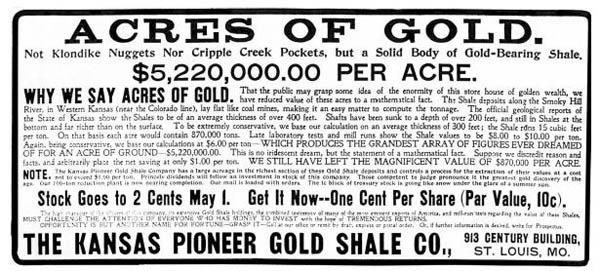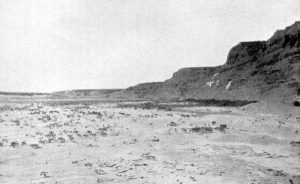Smokyhill, Kansas, once located in south-central Ellis County, was a “mining” town that is extinct today.
In the late 19th century, gold was on everyone’s minds when Charles Holliday and his railroad magnate father, Cyrus K. Holliday, believed that the Smoky Hill River area of Ellis County contained valuable mineral deposits. The idea that the shale along the Smoky Hill River contained ore originated in the mid-1800s as a scam by Native Americans who claimed to know of tin mines along the river. In the 1890s, prospectors found low percentages of ore-bearing zinc and gold in areas of Ellis and adjacent Trego Counties.
Sure that there might be gold in “them thar hills,” Charles Holliday bought land on the north bank of the Smoky Hill River to build a town he believed would become the center of Kansas’ first gold rush. A townsite was platted and filed in 1899, and Holliday immediately began selling lots. Some of the first residents came from nearby Chetolah, another extinct town, just across the Smoky Hill River. A post office opened on April 14, 1900.
Two gold mills — the Close and Holliday– would operate in the area for three years, but showed very little profit. Although gold and zinc were found in very small amounts, the cost proved to be far too much. For a few more years, miners scrambled up and down the river looking for the Mother Lode, but they would be disappointed. The Ellis County gold boom sputtered along from 1895 to 1903, by which time most everyone realized that there was no gold in the shale.
Charles Holliday abandoned the townsite in 1905, but the settlement continued to survive for several more years. In 1910, it had a population of 75, but people continued to leave. On June 15, 1915, its post office closed its doors for good. Nothing remains of the town today. It was located approximately 12 miles southwest of Hays.
©Kathy Alexander/Legends of Kansas, updated July 2025.

Acres of Gold in Kansas! D. R. Beatty bought land along the Smoky Hill River and sold shares with this advertisement in the St. Louis Globe-Democrat, April 27, 1902.
Also See:
See Sources.

